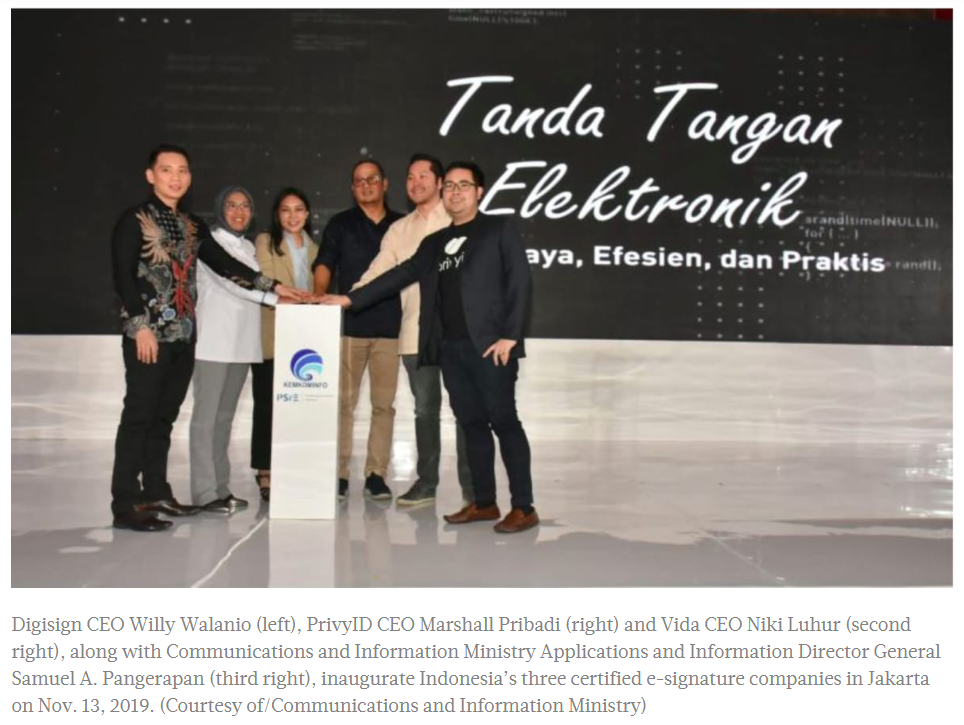Indonesia’s e-signature start-ups gain traction amid pandemic
An increasing number of Indonesian businesses have adopted local electronic signature (e-signature) technology during the past month as physical distancing measures make it difficult to ink contracts in person.
Jakarta-based e-signature providers Digisign and PrivyID recorded growth of 50 percent and 350 percent, respectively, in customer requests from February to March, which is when the government declared emergency disaster status and formally urged citizens to work from home, company executives told The Jakarta Post.
Digisign chief executive officer (CEO) Willy Walanio said that, out of the total inbound customers, defined as those contacting the company over a request, 70 to 80 percent had been “onboarded” into Digisign’s system.
“The realization is quite high, because in most of these cases there is not [just] an interest, but a need for the companies [to go digital],” he said. “We have been picking up the ball more often than throwing it.”
Digisign and PrivyID are two of just three e-signature companies certified by Indonesia’s Communications and Information Ministry, which gives them the upper hand in Indonesian courts. The third company, Vida, was not available for comment.
E-signature providers add to a list of nascent start-up industries, including grocery e-marketplaces and telemedicine, that have seen an uptick in business activity since Indonesia embarked on a work-from-home regime to contain the spread of COVID-19.
Such e-signature providers use personal identification information, big data and encryption technology to guarantee the authenticity of a signature without in-person verification.
PrivyID CEO Marshall Pribadi said his company, which secured 6 million Malaysian ringgit last year in a series A funding from Malaysia, also experienced a rapid diversification of customers to include, among others, contractors, consultancies, cigarette manufacturers, law firms and telecommunication providers, due to the work-from-home policy.
Initial demand for e-signature technology in Indonesia was driven by financial institutions, particularly peer-to-peer (P2P) lenders, that had to use such technology to authenticate transactions in line with Financial Services Authority (OJK) Regulation No. 77/2016.
“We have around 350 companies onboard right now and hope that, if just the major companies come onboard our system, we’d have a minimum 1,000 companies within three or four months,” said Marshall.
He added that, out of the total inbound customers, the start-up “immediately went live” with around 25 percent of them. This translated into 20 percent growth in new corporate customers. Growth was also aided by a two-month promotion campaign launched in March that waived registration fees for new customers.
With regard to international transactions, Marshall said most of PrivyID’s clients did not face legal difficulties as they generally dealt with countries whose e-signature-related laws were less stringent than those in Indonesia.
“We happen to be a civil law country, so when we deal with common law countries like Singapore, Australia or America, their relevant standards are below ours,” he said, noting that the European Union, the world’s strictest region in terms of data privacy, was an exception PrivyID was working on.
The advantage of certified e-signature providers such as Digisign and PrivyID over uncertified but popular alternatives, such as publicly-listed United States-based DocuSign, is that the former have stronger evidentiary value at Indonesian courts.
Such an advantage is stipulated in Government Regulation No. 71/2019 on the implementation of electronic systems and transactions although the Electronic Information and Transactions (ITE) Law recognizes both certified and uncertified providers.
“Currently, there isn’t enough [awareness] about the use of local e-signature providers, and therefore the use of e-signatures is not widely known,” said Daniel Pardede, a partner at one of Indonesia’s largest law firms, Hadiputranto Hadinoto and Partners (HHP).
“Consequently, most MNCs or foreign investment companies still rely on well-known international e-signature providers.”
He added that Indonesia’s regulations, such as those related to notaries and stamp duties, had not been adjusted to e-signature technology and that Indonesian courts had been slow to accept such technology. However, the law firm did not have any record of a court rejecting signatures from uncertified providers.
Ajisatria Suleiman, an advisor of the Indonesian Regtech and Legaltech Association (IRLA), an organization chaired by PrivyID’s Marshall, said the rise of e-signature technology in Indonesia was part of a larger, global trend toward contactless identity authentication technology.
“In Singapore, for example, the use of cash and debit- or credit cards has gone down, [as it is] replaced with mobile payments. Then comes even more contactless technology, like facial recognition, replacing fingerprint authentication,” he said.
Source: https://www.thejakartapost.com/news/2020/04/13/indonesias-e-signature-start-ups-gain-traction-amid-pandemic.html


 Thailand
Thailand




